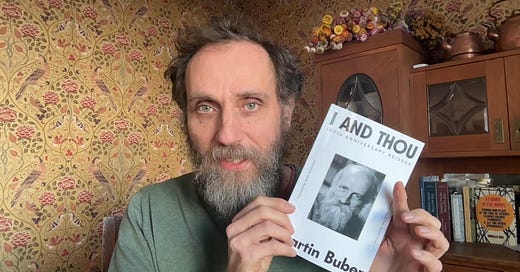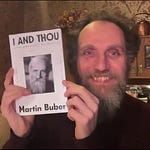When a culture is no longer centred in a living and continually renewed relational process, it freezes into the It-World which is broken only by the eruptive, glowing deeds of solitary spirits.
— Martin Buber, I and Thou
It was
who set this in motion with a post the other week where she brought At Work in the Ruins alongside Martin Buber’s I and Thou.So firstly, that was an honour to have my work mentioned in the same breath as a book that has mattered deeply to many of the people whose work has mattered to me. (Just in the neighbourhood here, that would include
, and .)And secondly, as I said on Notes, Abbey’s piece convinced me that I should really read I and Thou for myself.
The next thing that happened was I got a DM from my friend and co-conspirator,
, saying she’d also been meaning to read this book for about a decade, and how about it we do it together?So I said, alright, and what if we throw out an invitation to join us?
That’s how we find ourselves inviting you to Buber Club.
The Details
This is open to paid subscribers and supporters of Writing Home. If you’re feeling the pull to join us, but a month’s subscription would be an obstacle right now, then just drop me a note and I’ll comp you.
I and Thou is a short book – about 120 pages – so hopefully many of you will be able to read it in the course of this month. I’ll be reading it in the Walter Kaufmann translation from 1970, if that’s useful to know.
On Sunday, 2nd March,
and I will host a live Zoom call at 8pm Swedish time (CET), which is 7pm in the UK (GMT), 2pm on the East Coast and 11am on the West Coast.When it comes to the call, this isn’t a philosophy seminar, but an invitation for each of us to speak from the place within you that was spoken to by the book. If the size of the group is large enough to call for it, then we’ll use break-out rooms for part of the time.
*** The Zoom details are below the paywall on this post – and I’ll resend them on the day! ***
I’m also going to do something I’ve never had cause to do until now and open the Subscriber Chat for Writing Home, so we can use this as a group chat to compare notes during the course of the month as we’re reading the book.
And for anyone who can’t make it to the live call, I’ll share the recording afterwards.
Introducing my co-host
I first got to know Liz when editing the SANCTUM issue of Dark Mountain. She got in touch with an idea for an essay and I immediately knew that I wanted to read it.
In ‘The God-Shaped Hole’, she told the story of her journey as someone who would have called herself a “rationalist atheist”, trained as a scientist and working in public health, who developed a suspicion that something important had gone missing when people stopped going to church. You can read an extract from that piece and a conversation between the two of us from the online edition of Dark Mountain, ‘Believing in Holidays’.
From that editorial collaboration, our friendship grew, as Liz’s journey continued and her religious identity evolved. In 2019, she became chief officer of the UK Unitarians, a religious denomination with roots in the dissenting Christians of the 17th and 18th centuries. She’s also part of the Hard Art collective, “a handful of artists, scientists, movement builders, musicians, and democratic innovators” who came together in 2022 “to explore making a future based on care and freedom.”
For years now, Liz has been one of my ongoing conversation partners and co-conspirators, so it feels both natural and exciting to bring this invitation to you together.

A word about Martin Buber
I’m looking forward to learning more about Buber in the course of this month. He’s one of those figures who doesn’t easily fit into categories, but he’s often characterised as a German Jewish philosopher and religious thinker.
I and Thou was published in 1923, the year its author was appointed as the first lecturer in Jewish Religious Philosophy and Ethics at the University of Frankfurt. The book centres on two contrasting ways of being in the world, encapsulated in the “word pairs” I–Thou and I-It. Here’s
summarising the difference that Buber is pointing to, in a post from a couple of years ago:His premise is that most human encounters are I-It, not I-Thou. We can too easily move through the world as if other people are just service providers, types, means to an end, even those closest to us. I-it is subject-object, and therefore can’t help but be objectifying, erasing the full complexity of a human in favour of a mental shortcut or single characteristic, what tasks they can deliver for us. And Buber is pragmatic enough to know that sometimes this is fine, that the deep encounter of an I-Thou moment is not something we can maintain all day, with everyone. But I-Thou is a posture we can grow better at and actively seek out.
I’m curious to learn more about how Buber’s distinction might play into the thinking about “subject–subject” relations in Vanessa Machado de Oliveira’s latest work, and the wider thread around inhabiting “the cosmos as a community of beings” (h/t
) that is woven through a lot of what I’m reading and thinking and talking with people about these days. I’m wondering if there’s something here that connects to ongoing conversations about the borderlands of animism and monotheism.With that said, Buber’s thinking is woven through with God-talk, so if that is alienating to you, then this might not be an invitation for you just now. Likewise, a book written in 1920s Germany is going to use language that someone following similar paths of thought would be unlikely to choose today: if you need to, then add “[sic]” in pencil every time he uses the word “man” where you or I would write “humanity”. But let’s be willing to dance with thinkers from other times and places, even if we tread on each other’s toes, now and then.
On which note, consider yourself invited!












